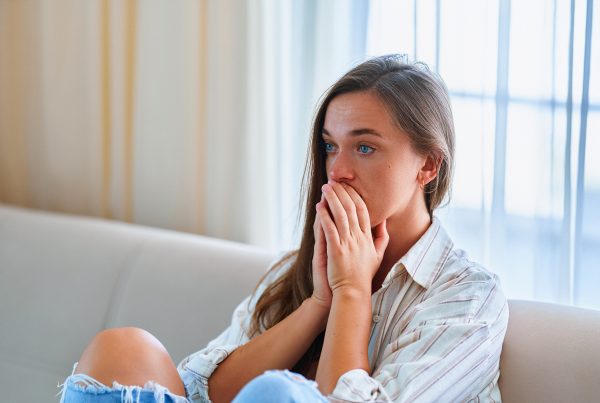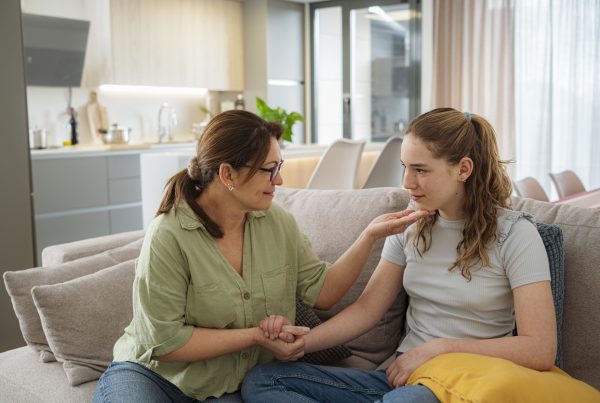It’s only natural to want the best for our kids – but that only makes it much harder when we find out that nothing we do seems to work. Anxiety disorders, like other mental health disorders, are complex and require a long-term treatment approach that combines individual therapy with support structures and medication. It’s not something we are equipped to deal with, let alone our kids. However, there are many ways you can learn how to help anxiety in teens.
Finding the best way to support your teen while they are struggling with anxiety can be difficult. But don’t let that diminish or erase the power you do have. Parents are ultimately a teen’s most important therapist because while they might not be professionally trained, they are always there, and that’s crucial.
Learning more about anxiety and how your actions can help your teen cope with their symptoms not only empowers them to better deal with their condition over time but gives you the means to provide meaningful help to your teen, while contributing to your own mental health.
Like any system, a family needs to work together to stay healthy. In that sense, contributing to your teen’s mental wellbeing also means making a contribution to yours. Let’s see how you can help.
What is Teen Anxiety?
On its own, anxiety is a synonym for fear or worry. It is the feeling of dread that precedes something unfortunate, whether imaginary or real. In a psychiatric sense, an anxiety disorder is an inappropriate, extreme, or generalized and overwhelming sense of fear or dread.
Teens with anxiety disorders are breaking down mentally over imagined dangers, or struggle to cope with both physical and mental symptoms of fear developed through chronic stressors, or very acute and traumatic experiences.
Anxiety itself is a normal human emotion. We tend to move into a state of stress in anticipation of something stressful, and it’s normal to feel nervous about an upcoming exam or a confrontation with someone else.
Disordered Anxiety
But disordered anxiety is misplaced and destructive. It robs our teens of their creative and cognitive abilities, slows learning and understanding, and can hold teens back from developing on par with their peers. Meanwhile, anxiety disorders can escalate, developing into worse physical and mental symptoms and co-occurring problems, such as depression, self-harm, eating disorders, and/or recreational substance use.
Teens are just as much at risk for anxiety as adults, even if their stressors and worries might not feel as “pressing” to an adult. The entire point of an anxiety disorder is that your teen’s fears and worries aren’t justified, regardless of what is triggering them.
Finding the Root of the Issue
Getting to the root of the issue isn’t always easy – post-traumatic stress symptoms can be traced back to the triggering event, but something like a generalized anxiety disorder can develop in a teen’s tween years simply due to inherent genetic factors.
Different Types of Anxiety
Anxiety disorders are not just some of the most common disorders in the world, but they also encompass a large variety of different conditions.
Some are more known than others, such as social anxiety, generalized anxiety, and obsessive-compulsive disorder. Some are less familiar, such as panic disorders and niche phobias. Every anxiety disorder has its own treatment plan and considerations. Some of the more common anxiety disorders include:
- Generalized Anxiety Disorder – Generalized anxiety disorder is the most common type of anxiety and is characterized by chronic worry and a blanket of fear over almost every waking moment. It can cause immense stress and both physical and mental fatigue. This fear often exists without any triggers or provocation.
- Social Anxiety Disorder – Social anxiety disorder or social phobia is characterized by overwhelming feelings of dread in social circumstances, whether it’s being introduced to someone new or being asked to speak in public. Most cases of social phobia involve one or two specific fears, such as a fear of crowds or fear of public speaking. Some cases of social phobia are more intense and widespread.
- Post–Traumatic Stress Disorder (PTSD) – PTSD is characterized by multiple different sets of symptoms, including hypervigilance, unwanted remembering, dissociation from the event (or reality itself), selective amnesia, generalized anxiety, and panic attacks.
- Panic Disorder – Panic disorder is characterized by multiple recurring panic attacks within a short period of time. Panic attacks are physical manifestations of anxiety that feel like a heart attack, including shortness of breath and a sense of impending doom.
- Obsessive–Compulsive Disorder (OCD) – OCD is characterized by obsessions (unwanted thoughts and intrusive fantasies) coupled with compulsions (ritualistic or repetitive behavior that soothes the anxiety and temporarily delays the thoughts but may cause them to return shortly). This cycle can be self-destructive, especially if the compulsions can cause harm, such as excessive handwashing.
- Phobias – Phobias are intense fears characterized by recurring nightmares and fight-or-flight reactions even in innocuous circumstances. Someone with an intense fear of spiders won’t just be unable to look at a picture of them but might experience frequent unwanted thoughts about spiders in their clothing, or underneath carpets, in shoes, or on the ceiling, without any warning or triggers.
How to Help Anxiety in Teens at Home
As a parent, your support is crucial. Many teens nowadays are aware of anxiety disorders and may even go to certain lengths to hide their symptoms to avoid a diagnosis, or the stigma that is still attached to mental health issues. However, encouraging your teen to talk openly about their worries and anxieties can be an important form of support.
Be there to listen to them and help reassure them that they can be honest about how they feel with no judgment from you. Anxiety disorders can take normal worries and amp them up into major problems, and it’s important to acknowledge the way your teen feels, rather than try to minimize these feelings or tell them that they’re blowing them out of proportion.
While it’s understandable that you’d want to “explain” that your teen’s anxieties are exaggerated, it’s not a sentiment that works or makes them feel better. It just makes them feel worse for feeling the way they do. Instead, help them find constructive ways to deal with their anxieties, such as encouraging them to take up a coping skill that has worked for them in the past (like journaling, drawing something, or playing an instrument), or help distract them (watch a comedy together, go for a walk outside, or cook something together).
Stress Management and Coping Skills
Stress management and coping skills are both crucial parts of anxiety treatment. Many anxiety conditions can get better or worse over time. Some are tied to a specific time period or are strongest after a traumatic event. Professional treatments, including therapy and medication, can help manage and even minimize the impact an anxiety disorder can have on your teen’s life.
But it is their continued commitment to certain learned coping skills – and your continued support, as a friend or family member – that help them keep anxiety symptoms in check. These might include sports, creative endeavors, their dream job, nature getaways, or healthy rituals, such as maintaining a good sleep schedule, developing a cooking habit, or finding other constructive outlets for their stress and anxiety.
Stress management, on the other hand, is the prophylaxis for anxiety. It is meant to help keep stressors down and avoid mental fatigue that may lead to exacerbated anxiety issues. This can include avoiding mental rumination, avoiding procrastination, better sleep and diet, regular exercise, and healthier relationships.
Get Help for Teen Anxiety at Visions Treatment Centers
Sadly, there is no replacement for professional treatment. If you or a loved one are struggling with anxiety, it’s in your best interest to seek professional help. Therapy can be a big step forward and can help you lead your best life. Reach out to us at Visions Treatment Centers for more information.








